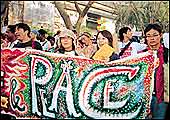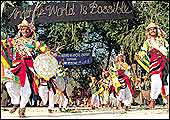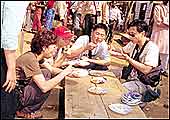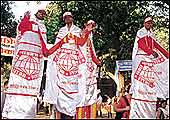|
Down
with the imperialism. Say no to Globalisation," hollers C.Y.
Park into a bullhorn, furiously waving a gigantic red-on-white placard.
The slogan is picked up by a motley crew of angry activists. Were
it not for their designer shades, New Balance trainers and pronounced
accents, Park and his comrades might be mistaken for a bunch of
rabid reds exercising their vocal chords on a wintry afternoon in
Kolkata's Brigade Parade ground. Only, Park is South Korean, the
venue is not red-citadel Kolkata but India's financial capital,
Mumbai, and Park and Co. have flown half way across the world to
unite with thousands of their ilk in the fight against globalisation.
To a bird, it must look as if a sea of humanity
has washed over the 65-acre Nesco ground in Mumbai suburb Goregaon.
On the ground, it is sheer bedlam. Sights and sounds explode in
a chaotic cacophony as 100,000 people simultaneously try to sing,
dance, talk, shout, wave, eat, and be heard. A group of ecstatic
tribals waltz down one road, elaborate headgear swaying to the beat
of the drums. Another group, this composed of bewildered map-clutching
middle-aged Japanese, scurries off the road as three men on 10-foot
stilts rush towards it. Petite silk headband-clad Tibetan girls
hand out 'Free Tibet' leaflets. And tactile Italians hug everyone
around like long lost friends. Drums pound, cymbals clang, pipes
do whatever pipes are supposed to do and somewhere a solitary bugle
lets out a soulful wail. An incessant stream of messages pours out
of the pa system. The air grows heavy with cries of "Zindabad,
Zindabad; No War, Only Peace; Stop the Killing", the alarmist
content further reinforced by gigantic flags, cardboard cutouts,
and ubiquitous placards.
In some ways, the World Social Forum is a bit
like the Matrix: no one can really tell you what it is, you have
to experience it yourself. One organiser calls it "A mobilisation
of public opinion". Another, "A platform for mass organisations
across the world to build alliances and raise a resounding cry against
globalisation and neo-liberal economic policies." Conceived
as an alternative (a word oft used during the five days) to the
yearly fat-cat World Economic Forum in the Swiss resort of Davos-scheduled
to start after the WSF ends-the first WSF was held in the Brazilian
town of Porto Alegre, the Jerusalem for all those into alternative
causes, in 2001. "We knew we had to take the forum out of Brazil
and India was the first choice," says Chico Whitaker, Founder,
Convener, and the "moving spirit" behind WSF.
 |
| Peace and protests against war were recurring
themes at the WSF jamboree |
Under the gargantuan sheds of an abandoned engineering
factory this hotchpotch coalition of protectionist labour unions,
gender activists, card carrying communists, environmentalists, farmers,
peasants, anti-sweat shop protesters, anti-genetic food activists,
and antelope savers huddles, for five days and nights living out
the WSF motto: Another World is Possible. Every fringe, alternative,
minority, dispossessed group one can imagine is here; 2,660 organisations
from 132 countries, participating in a staggering 1,200 events that
span plenary sessions, conferences, panels, round tables, workshops
solidarity meetings, street theatre, film shows, rallies, and marches.
There is no issue or cause that this rag tag
bunch of activists doesn't attack with characteristic zeal and aplomb.
From land, water, and food sovereignty, to patriarchy and gender
discrimination, to militarisation, social security and workers rights,
to gay activism and third world debt, everything is fiercely debated
and dissected. It doesn't matter what it is as long as you are angry
and not afraid to show it.
 |
| Ecstatic tribals waltzed down roads, their
elaborate headgear swaying to the beat of drums |
With his flowing dreadlocks interspersed with
multicoloured beads and psychedelic T-shirt, Marco Somma looks more
like a Rastafarian than a member of Movimento Non-Violento, a Rome-based
organisation inspired by Mahatma Gandhi. "We are against the
war in Iraq and have come here to protest," says Marco's brother
Andrea in faltering English. Tomokazu Kuroba, clad in a purple kimono,
is trying to talk to me even as others from the 80-strong East Japan
Railway Workers bang away gleefully on bowl-shaped Japanese drums.
Between politely bowing and juggling a range of printed pamphlets,
he gets me to sign up for a campaign supporting labour solidarity.
WSF 2004 doesn't boast sniffer dogs and stretch
limos and Swiss chalets, but its roster of special invitees would
be at home equally on the snowy slopes of Davos. Nobel laureates
Shirin Ebadi and Joseph Stiglitz are here, as is anti-war activist
and British Labour party mp Jeremy Corbin, author turned social
activist Arundhati Roy, Medha Patkar, and Jose "Asterix"
Bove, the French farmer and activist with a penchant for wrecking
McDonald's outlets.
Delegates brave Mumbai trains, hard camp beds,
and alien tongues to hear their heroes. The Evil Triangle of IMF,
World Bank and WTO is ruthlessly attacked as are selfish and rapacious
multinationals.
 |
| 160 food stalls and 30 beverage outlets sold,
among others, Chinese, Korean, Thai food |
Then, there's the food court: 160 food stalls
and 30 beverage outlets selling Chinese, Korean, Thai, South Indian,
Maharashtrian, Konkani, you-name-it food. A blonde Finn sits on
the ground, surrounded by illiterate farmers from interior Maharashtra,
polishing off spicy curry-rice off a leaf plate. A South Korean
coyly shares piping hot idlis with two vivacious French students.
A middle aged Spanish lady is trying out a plate of pani-puris.
Coke and Pepsi are banned (naturally!) and delegates have to be
content with indigenous Kokum and bottles of mineral water.
Just across the busy Western Express Highway,
and a few hundred metres from WSF's venue, Darshan Pal, clad in
a white shirt and grimy khaki cargos is squatting in a corner of
the dais. Full bearded, muscled, and swarthy it's not difficult
to visualise the convener of Mumbai Resistance 2004 for the firebrand
leader he is. "They (WSF) are separating globalisation from
capitalism and imperial domination and that just can't be done,"
he rants. A loose confederation of 300 ultra-left national and international
organisations, Mumbai Resistance is holding a forum of its own,
to protest WSF's protest forum. Apart from being fed up with WSF's
conciliatory approach, Mumbai Resistance is against the forum being
funded by cash rich (and by extension, imperialist) bodies such
as Oxfam and Action Aid. For the record, three organisations, the
Netherlands-based Hivos and Novib and UK-based Oxfam are said to
have contributed 60 per cent of the WSF's Rs 12 crore budget. Rebuts
Nandita Shah, a member of WSF's Finance committee, "Forget
cash rich, we're running a budget deficit of more than a crore."
 |
| Utopian dreams apart, views remained as divergent
as ever when it came to offering alternatives |
At the end of the day, WSF is obviously more
about participation than prescription. Despite all the capitalist-bashing,
very few alternative ideologies are proposed. High on rhetoric and
sophistry, the speakers successfully pull down existing structures
but are unable to articulate feasible alternative structures. Participants
are convinced that if, in the past, protests against capitalism
produced a whole new set of social and economic ideologies like
communism, socialism, and fascism, there is no reason why a new,
coherent, universal ideological alternative to globalisation cannot
emerge.
With a goatee and wire-rimmed glasses Lev Gossman
exemplifies the leitmotif of the meet. A 21-year-old Jewish student
from California who swears by contemporary hip-hop artists like
Dead Prez, Most Def, and Talib Kweli, he belts out his personal
rap-inspired ode to WSF, set to a syncopated bass beat.
"Lyrically, I bring out the synergies,
Interaction of discrete agencies,
Bringing the sum of the parts together,
Am not so strong individually."
And the applauding throng around the dais clambers
aboard, joining him in an impromptu jig.
|
